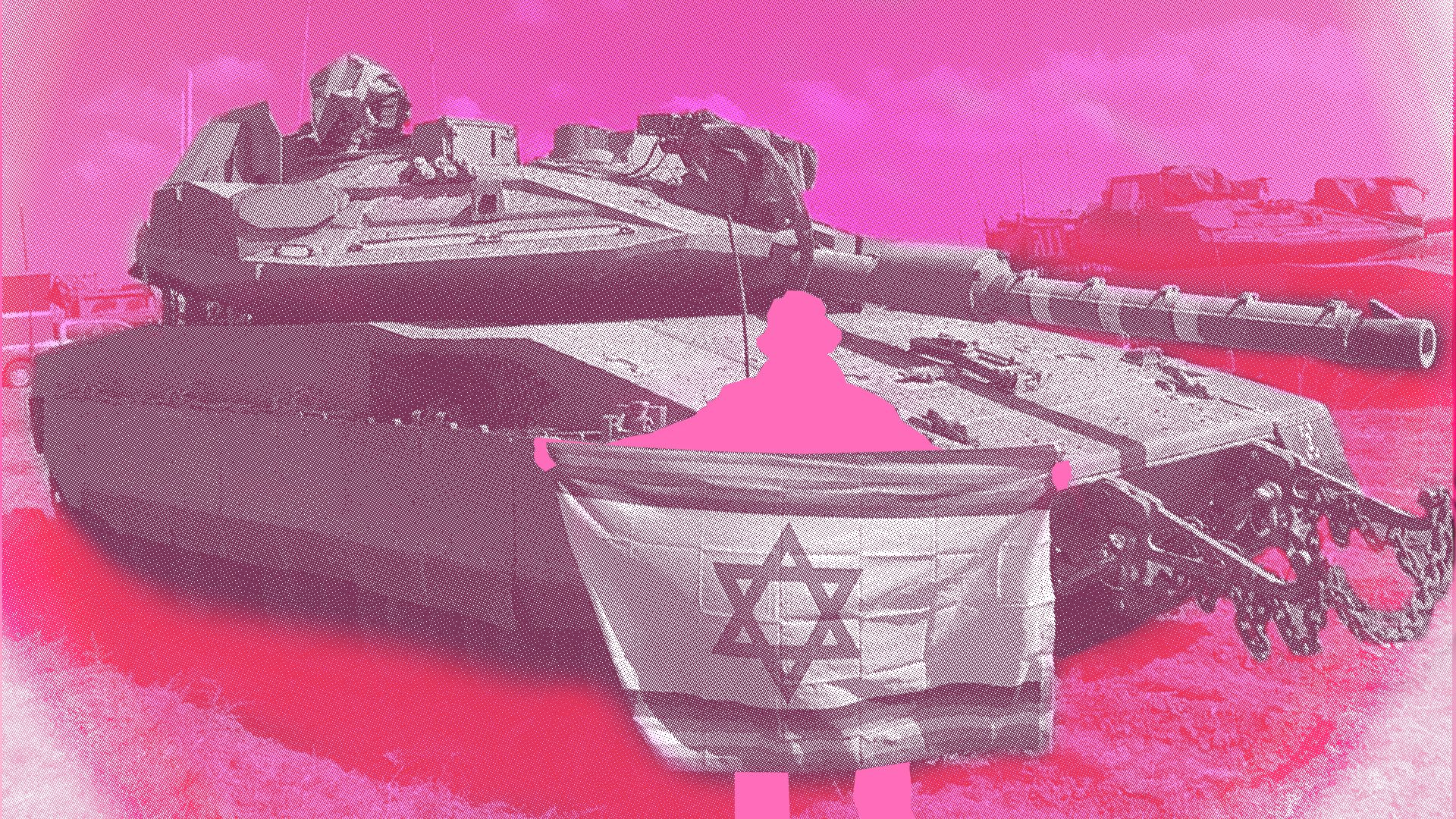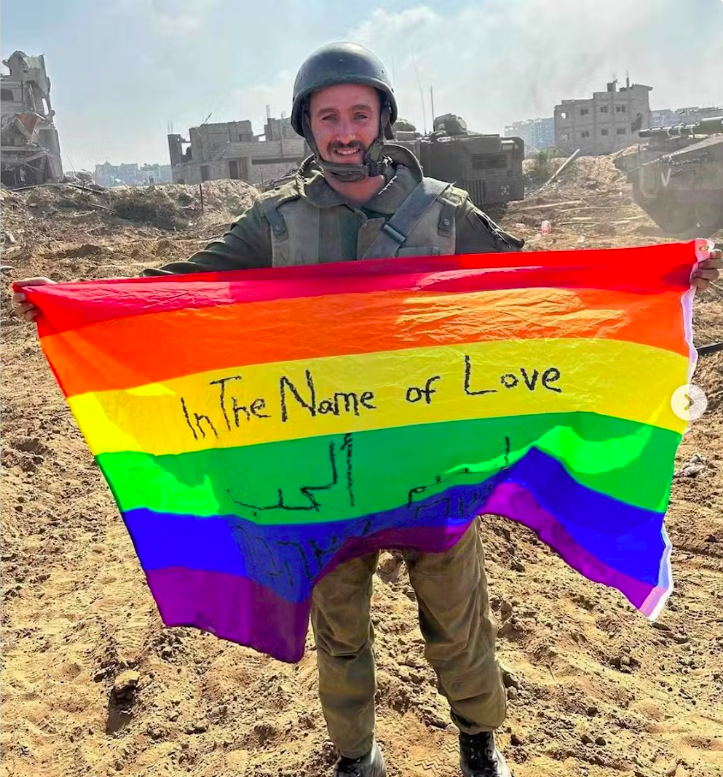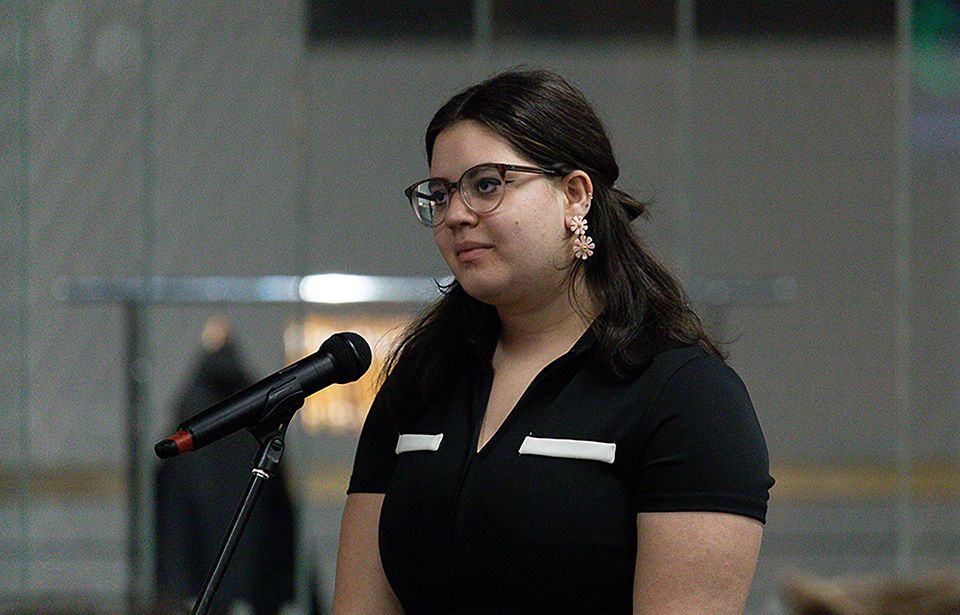Rainbow Military Capitalism is Just Repackaged Colonialism
In this exchange, Zina Abu Ali and Makanaka Tuwe reflect on how rainbow capitalism and pinkwashing obscure violence, tug on our belongingness wounds, and erase the abolitionist history of the Pride movement.
Late last year, an image of an Israel Defense Forces (IDF) soldier raising the rainbow flag in front of several tanks went viral. Written in Arabic and English on the flag are the words “in the name of love”. On social media, the soldier, Yoav Atzmoni, wrote: “despite the pain of war, the IDF is the only army in the Middle East that defends democratic values. It is the only army that allows gay people the freedom to be who we are. And so I fully believe in the righteousness of our cause.” Another caption, accompanying the image, stated that this was “the first ever Pride flag raised in Gaza”.
Israeli soldier Yoav Atzmoni holds up a pride flag with the words, ‘in the name of love’ written overtop it. Instagram. Source: The Conversation
In this exchange we reflect on rainbow capitalism, and unpack this image and statement as examples of pinkwashing, a strategy that is employed to obscure ongoing violence, tug on our belongingness wounds, and erase the abolitionist history of the Queer Pride movement. Activists, specifically Palestinian groups and those in solidarity with them, refer to the appropriation of the sexual liberation movement to serve a political agenda as ‘pinkwashing’. Since 2005 Israel has been invested in a tourism campaign that presents the state as the ‘gay mecca’ of the Middle East. This campaign also includes positioning their 75-year systemic violation of Palestinian human rights as one that is invested in queer liberation.
We met in 2020, when Professor Camille Nakhid invited the two of us, along with others, to write papers based on the findings of a research project she had conducted about queer ethnic young people in Aotearoa. Zina is a queer Palestinian femme and Makanaka is a Black femme born and raised in Zimbabwe.
Zina
Brand Israel
In 2005 the Israeli Prime Minister’s Office and the Foreign Ministry collaborated to establish Brand Israel, a strategic initiative aimed at reshaping the state’s global image. The original portrayal of Israel as excessively focused on its military identity was considered a hindrance to the desired image of civility. The goal of Brand Israel was to move away from the perception of Israel as primarily a military force and present a more civil and democratic image, particularly to the gay community worldwide. Recognising the need for transformation, American marketing executives put their hands up to help with this rebranding effort, and a revamped image of Israel was introduced to the world.
In 2007 we saw Gal Gadot, a former IDF soldier, prominently featured in an issue of Maxim magazine in a bikini, in front of a backdrop of modern and scenic occupied Yaffa (Tel Aviv). This picture was one of the initial attempts to humanise the Israeli military and showcase its tolerance, which continued with subsequent images, including photos of queer Israeli soldiers kissing in uniform. The sight of police and military uniforms celebrating Pride seeks to erase the violent history of the military and police towards the queer community as a whole – a history that pro-LGBTQIA+ social media efforts can’t fully amend. While these visuals aimed to highlight the humanity and inclusivity of the military, were they enough to contrast the military’s unlawful use of white phosphorus in Gaza and Lebanon at the time?
While Israel is open to foreigners and gay tourists enjoying the beaches and nightlife, the experience for local queers is markedly different. In 2009 an LGBTQIA+ youth centre in Tel Aviv was targeted in a shooting that resulted in three deaths and 11 injuries. The response from the police spokesperson, Micky Rosenfeld, who suggested it was “most likely a criminal attack, not a terror attack”, emphasised that if the perpetrator wasn’t Palestinian, then it probably wouldn’t be considered a terror attack.
The only democracy in the Middle East
While Israel consistently portrays itself as the sole democracy in the Middle East, this claim only extends to its nine million Israeli settlers. The two million internal Palestinian citizens and the three million Palestinians enduring the 57-year-long occupation in the West Bank have never received these democratic rights, with the latter group essentially having none. These millions of Palestinians remain disenfranchised within the “the only democracy in the Middle East”. Don’t the almost 30,000 Gazan civilians who have been slaughtered over the past 15 weeks lack enfranchisement in this democratic narrative? Yet Israel continues to market itself as a gay paradise, amplifying the gay-versus-Muslim narrative. This strategy serves to vilify and scapegoat the entire population of Palestinians as homophobic, while positioning Israel as a beacon of progressiveness and tolerance, seemingly justifying genocide.
Blackmail
For the queer Palestinians fortunate enough to survive the genocide, they need to also survive the severe consequences of being outed, often under the eye of the occupying military. Once outed to military institutions, queer Palestinians find themselves at a crossroads: either become an informant against their own people, join the IDF, or risk being outed to their families, compromising their safety, identity, or loyalty to their community. Members of the military intelligence corps known as Unit 8200 have testified that the Israeli intelligence services try to locate LGBTQIA+ Palestinians, threatening to expose them if they don’t agree to become informants for the army. Early last year, Zuhair Ghaleeth, a 23-year-old gay man, and a resident of my hometown, Nablus, was murdered after his sexual orientation was used to extort him.
...how can a nation claim to take pride in its inclusivity while actively committing genocide?
Israel loves to splash the colours of the rainbow across Pride parades and even rockets, weaving a narrative of LGBTQIA+ inclusivity and celebration through the destruction they wreak. But how can a nation claim to take pride in its inclusivity while actively committing genocide? This claim of progressiveness, measured by the mobility of gay individuals within its settler-colonial society, is a manipulative ploy to divert attention from its oppressive regime – the government’s contribution to what can only be described as a public-relations tool. This feeds into rainbow capitalism, where we have seen, time and time again, these colonial forces of capitalism, corporatism and consumerism profit from the LGBTQIA+ movement – always prioritising profit over the support and liberation of queer people worldwide.
The image of an IDF soldier holding a Pride flag amidst the ruins of Gaza, scrawled with “in the name of love”, exemplifies this paradox. The questions linger: How does one bring Pride to a place by decimating it? How do Palestinian queers hope for democracy when they face death? And how can they proudly wave their Pride flags when their homes lie in ruins? The interconnectedness of LGBGTQIA+ liberation and the need for Palestinian freedom emphasises that true liberation for queer individuals cannot exist in isolation; it is intertwined with liberation of an entire people.
...true liberation for queer individuals cannot exist in isolation; it is intertwined with liberation of an entire people.
You cannot liberate some at the expense of others. This emphasises the imperative of pursuing liberation without harm and marginalisation. There is no queer liberation for Palestinians if there is not a free Palestine.
Makanaka
As soon as I saw that image of the IDF soldier waving the rainbow flag, I thought back to the conversations we’d had together about pinkwashing during our time co-authoring a paper about the lack of support for queer ethnic young people in Aotearoa, and what some of the barriers to accessing social and professional support were. Some queer folk, especially those who are further minoritised by race, ethnicity and/or class, have to navigate the anxiety of limited access to queer-friendly spaces, professional support and holiday destinations, among other things. This anxiety is further compounded by not being able to distinguish whether a space is truly queer friendly or if it’s part of a marketing strategy. Some organisations and institutions market and present themselves as being queer friendly to either bring in more capital, access a wider and more diverse audience, access additional funding or influence public image, while masking aspects of their operations and systems that are oppressive. For instance, some corporations may engage in Pride Month festivities and include pronouns in their email signatures, while simultaneously discriminating against queer employees or supporting policies and politicians that discriminate against the queer community.
Such imagery also perpetuates the idea that queerness is a Western phenomenon, as it ignores and erases how, in the process of ‘raising the first Pride flag’ in Gaza, thousands of queer Palestinians, their families, friends, communities and homes have been murdered, destroyed and displaced. And continue to be. In an Instagram caption, model and activist Munroe Bergdorf comments on how this type of imagery and messaging reinforces the myth “that queer people are ‘not there’ because there are no pride parades, no media representation, no ability to protest or congregate as a visible community. All things that we literally had to fight past Western governments to have.”
As I continued to look at the image, I reflected on how this form of pinkwashing distorts the abolitionist roots of the LGBTQIA+ movement.
As I continued to look at the image, I reflected on how this form of pinkwashing distorts the abolitionist roots of the LGBTQIA+ movement. The political framework of the movement calls for a refusal of all oppressive forces, and is an invitation to collective liberation. Author Fatima Asghar urges us to care about Palestine and reminds us that “radical queerness rests on a foundation of valuing human life”. Rereading the caption, I thought about how I’m becoming less and less of a fan of firsts. Although to recognise the first occurrence of something is to honour a milestone and history being made, I would dispute that the first occurrence of anything is enough to justify the subjugation and colonisation of others. As I have been witnessing the manifestation of decades of suppression, I have been contemplating the politics of rainbow capitalism and such acts of pinkwashing. What is at stake when our movements are solely centred on markers of belongingness and the politics of representation?
“the IDF is the only army in the Middle East …”
The claim to being the only, while factually correct, misrepresents the relations queer Palestinians have amongst themselves and their societies, and the strategies they employ to be in community. It also erases the agency queer Palestinians have to navigate the expression of their queerness in the context of their location and circumstances. Platforms such as Queering the Map, where LGBT-identifying users can make anonymous geotagged posts, have illustrated the non-heteronormative relations present globally. While there are no timestamps on these messages, some posted from Central Gaza have recently gone viral, shedding light on varying intimate relations through notes and love letters.
“that defends democratic values …”
Whose values are being defended? What exactly are those democratic values? We all have different ideas of what terminology might mean, based on our unique worldviews and lived experiences, and the intentional vagueness of such definitions is a means to obfuscate accountability in order to employ favourable rhetoric.
“the only army that allows gay people …”
This statement erases the violent history and current varying forms of violence being enacted on queer people living in Israel. The statement is supposed to denote an invitation and a welcome of sorts – that queer people around the globe can be accepted into the Israeli military without discrimination. It left me with questions. How can we begin to untangle the human desire to belong, and feel like we’re a part of something, from the oppression of another? How can we divest from a politics of representation that is actively undermining the freedom of others?
Ultimately this image has become a display of an individualised and Western approach to queerness, community and solidarity. The reality is all oppression is intertwined, and we must begin to untangle our joy, liberation and luxury from the oppression of another. We cannot, in these times, reduce the LGBTQIA+ liberation movement to us against them. That is the oldest divide-and-conquer tactic. As children of migrants, we know there is no separating the intersections we straddle. We are simultaneously migrant, queer, ethnic and femmes. Our queerness is a part of everything we embody.
As I continue to reflect on actions and solidarity as a long-distance witness, I find myself returning to the Combahee River Collective and the Black feminist statement made in 1978. On page five of the statement, they declare: “we realize that the liberation of all oppressed peoples necessitates the destruction of the political-economic systems of capitalism and imperialism as well as patriarchy.” And that is what I will keep in my toolkit of resisting the fallacies that Israel’s campaign is pushing. Our work and practices must be organised for the collective benefit. There is no queer liberation for Palestinians if there is not a free Palestine.
This piece is presented in partnership with Auckland Pride. They've covered the costs of paying our writers while we retain all editorial control.
Header image by Anastasia Burn




